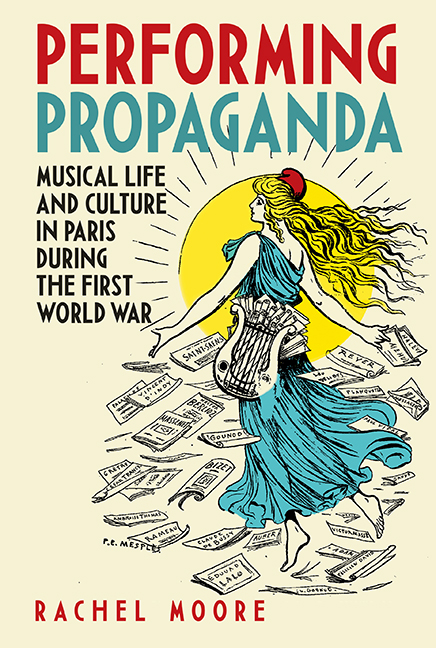 Performing Propaganda: Musical Life and Culture in Paris during the First World War
Performing Propaganda: Musical Life and Culture in Paris during the First World War Book contents
- Frontmatter
- Contents
- List of Illustrations
- List of Tables
- Acknowledgements
- List of Abbreviations
- Introduction
- 1 Musical Institutions on the Home Front
- 2 The Origins of Wartime Musical Propaganda: From the Written Word to Performing Globetrotters
- 3 Saint-Saëns's Germanophilie as a Propaganda Prototype
- 4 Propaganda on the Concert Stage: The Matinées Nationales
- 5 Creativity and Compromise at the Opéra
- 6 Music Publishing and the Édition Française de Musique Classique
- Conclusion
- Bibliography
- Index
- Miscellaneous Endmatter
6 - Music Publishing and the Édition Française de Musique Classique
Published online by Cambridge University Press: 19 July 2019
- Frontmatter
- Contents
- List of Illustrations
- List of Tables
- Acknowledgements
- List of Abbreviations
- Introduction
- 1 Musical Institutions on the Home Front
- 2 The Origins of Wartime Musical Propaganda: From the Written Word to Performing Globetrotters
- 3 Saint-Saëns's Germanophilie as a Propaganda Prototype
- 4 Propaganda on the Concert Stage: The Matinées Nationales
- 5 Creativity and Compromise at the Opéra
- 6 Music Publishing and the Édition Française de Musique Classique
- Conclusion
- Bibliography
- Index
- Miscellaneous Endmatter
Summary
STROLLING DOWN the boulevard Haussmann in early 1915 in search of an edition of Beethoven's piano sonatas, a music student might have been intrigued to find that the window display of the music publisher Charles Hayet had changed radically. Gone were the popular Peters and Litolff volumes and in their place were series with titles such as Édition nationale française and Édition nationale de musique classique. Reassured to find the Peters edition on the shelves inside, the student would have been surprised to discover the required volume tagged with the notice: ‘À ne pas ouvrir pendant la guerre’. Similar notices were attached to other shelves, specifically to stocks of German editions. One can imagine the scene as the student hovered indecisively, torn between loyalty to a professor's recommendation to obtain the Leipzig edition, and potential embarrassment at being seen to purchase a seemingly taboo volume.
The reported scenario in Hayet's shop reflects wider wartime unease amongst Parisians towards any product originating in enemy territory. As government reassembled in Bordeaux following its evacuation from the capital, it began to consider measures to safeguard the country, both physically and economically. With national borders put under heightened security, on 27 September 1914, a decree was issued banning all commercial relationships with enemy countries, as printed in the Bulletin de la Chambre de commerce de Paris: ‘Due to the war and in the interests of national defence, all trade with those from the German and Austro-Hungarian Empires or with people living there, is and will remain prohibited. Likewise, people from these empires are forbidden to engage in any trade on French territory or in any French protectorate, either directly or via an intermediary.’ Similarly, all business contracts continuing from pre-war years with enemy nations were declared void for the duration of the war and until further notice.
Trade with the German or Austro-Hungarian Empires was banned on account of the obvious economic benefits sales of their products gave to the enemy nation. In order to establish the nationality of firms, the government built an information-gathering network, via consular agents abroad and the Office national du commerce extérieur. Official lists of firms abroad considered ‘enemy’ or ‘suspect’ were published in the government's monthly official newspaper, the Journal officiel.
- Type
- Chapter
- Information
- Performing Propaganda: Musical Life and Culture in Paris during the First World WarMusical Life and Culture in Paris during the First World War, pp. 173 - 216Publisher: Boydell & BrewerPrint publication year: 2018
